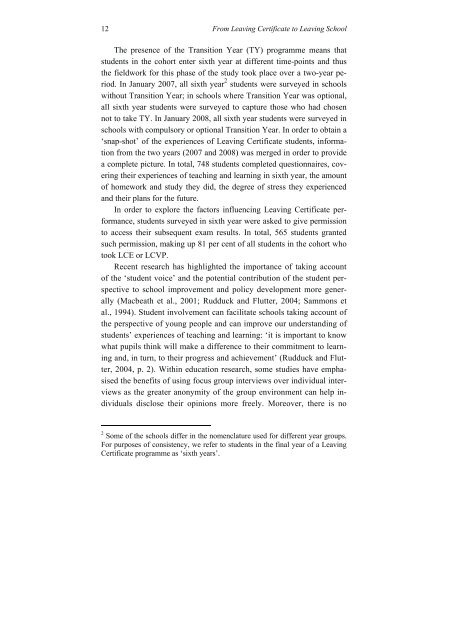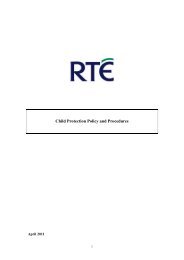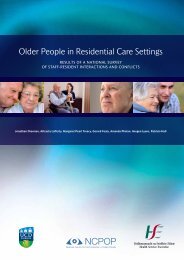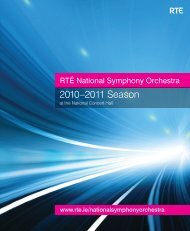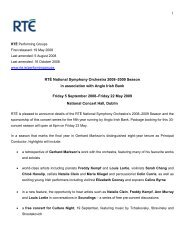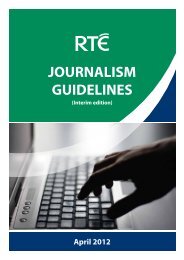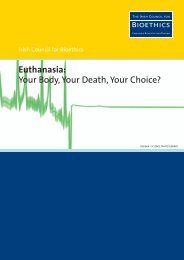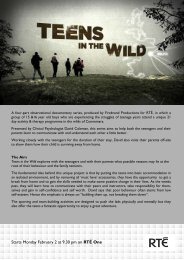From Leaving CertiFiCate to Leaving SChooL a Longitudinal Study ...
From Leaving CertiFiCate to Leaving SChooL a Longitudinal Study ...
From Leaving CertiFiCate to Leaving SChooL a Longitudinal Study ...
You also want an ePaper? Increase the reach of your titles
YUMPU automatically turns print PDFs into web optimized ePapers that Google loves.
12<br />
<strong>From</strong> <strong>Leaving</strong> Certificate <strong>to</strong> <strong>Leaving</strong> School<br />
The presence of the Transition Year (TY) programme means that<br />
students in the cohort enter sixth year at different time-points and thus<br />
the fieldwork for this phase of the study <strong>to</strong>ok place over a two-year period.<br />
In January 2007, all sixth year 2 students were surveyed in schools<br />
without Transition Year; in schools where Transition Year was optional,<br />
all sixth year students were surveyed <strong>to</strong> capture those who had chosen<br />
not <strong>to</strong> take TY. In January 2008, all sixth year students were surveyed in<br />
schools with compulsory or optional Transition Year. In order <strong>to</strong> obtain a<br />
‘snap-shot’ of the experiences of <strong>Leaving</strong> Certificate students, information<br />
from the two years (2007 and 2008) was merged in order <strong>to</strong> provide<br />
a complete picture. In <strong>to</strong>tal, 748 students completed questionnaires, covering<br />
their experiences of teaching and learning in sixth year, the amount<br />
of homework and study they did, the degree of stress they experienced<br />
and their plans for the future.<br />
In order <strong>to</strong> explore the fac<strong>to</strong>rs influencing <strong>Leaving</strong> Certificate performance,<br />
students surveyed in sixth year were asked <strong>to</strong> give permission<br />
<strong>to</strong> access their subsequent exam results. In <strong>to</strong>tal, 565 students granted<br />
such permission, making up 81 per cent of all students in the cohort who<br />
<strong>to</strong>ok LCE or LCVP.<br />
Recent research has highlighted the importance of taking account<br />
of the ‘student voice’ and the potential contribution of the student perspective<br />
<strong>to</strong> school improvement and policy development more generally<br />
(Macbeath et al., 2001; Rudduck and Flutter, 2004; Sammons et<br />
al., 1994). Student involvement can facilitate schools taking account of<br />
the perspective of young people and can improve our understanding of<br />
students’ experiences of teaching and learning: ‘it is important <strong>to</strong> know<br />
what pupils think will make a difference <strong>to</strong> their commitment <strong>to</strong> learning<br />
and, in turn, <strong>to</strong> their progress and achievement’ (Rudduck and Flutter,<br />
2004, p. 2). Within education research, some studies have emphasised<br />
the benefits of using focus group interviews over individual interviews<br />
as the greater anonymity of the group environment can help individuals<br />
disclose their opinions more freely. Moreover, there is no<br />
2 Some of the schools differ in the nomenclature used for different year groups.<br />
For purposes of consistency, we refer <strong>to</strong> students in the final year of a <strong>Leaving</strong><br />
Certificate programme as ‘sixth years’.


